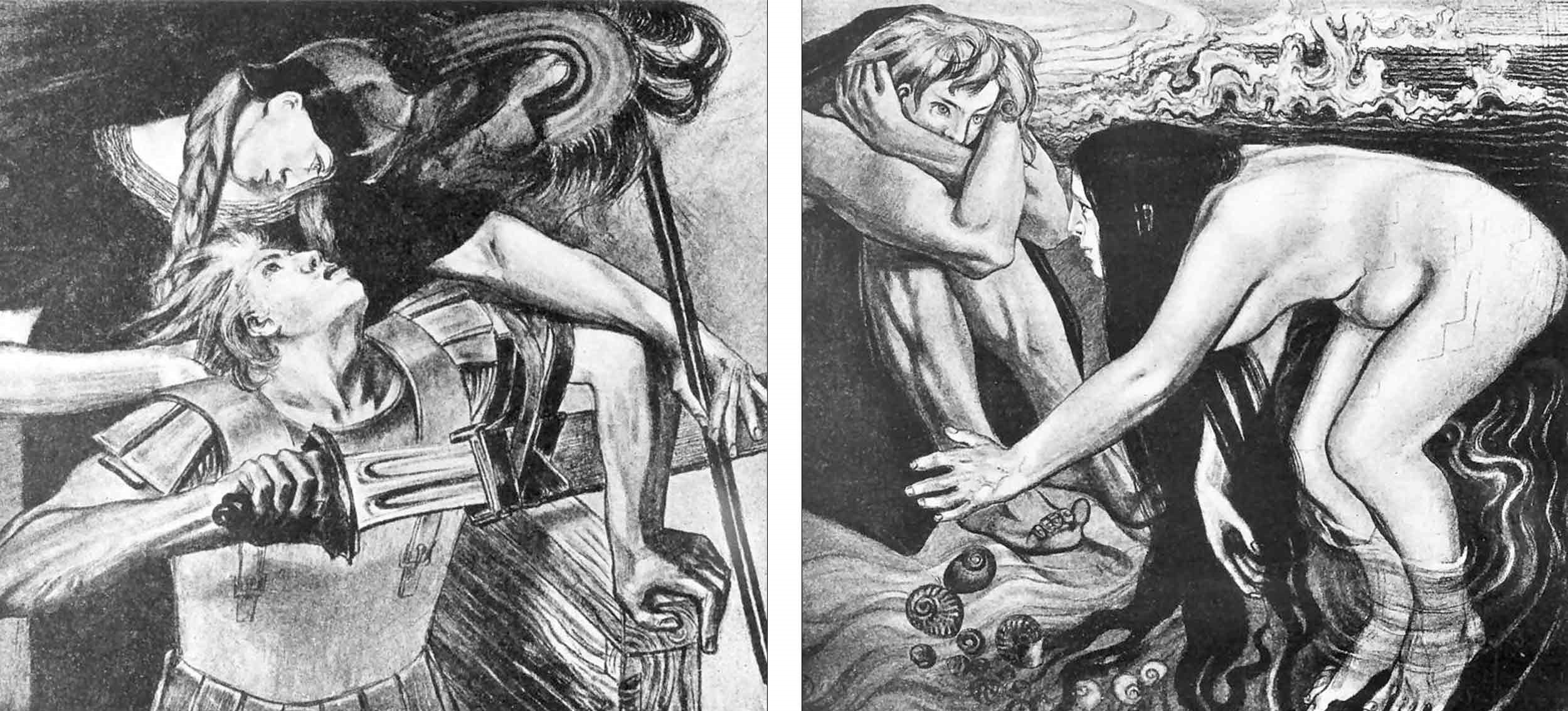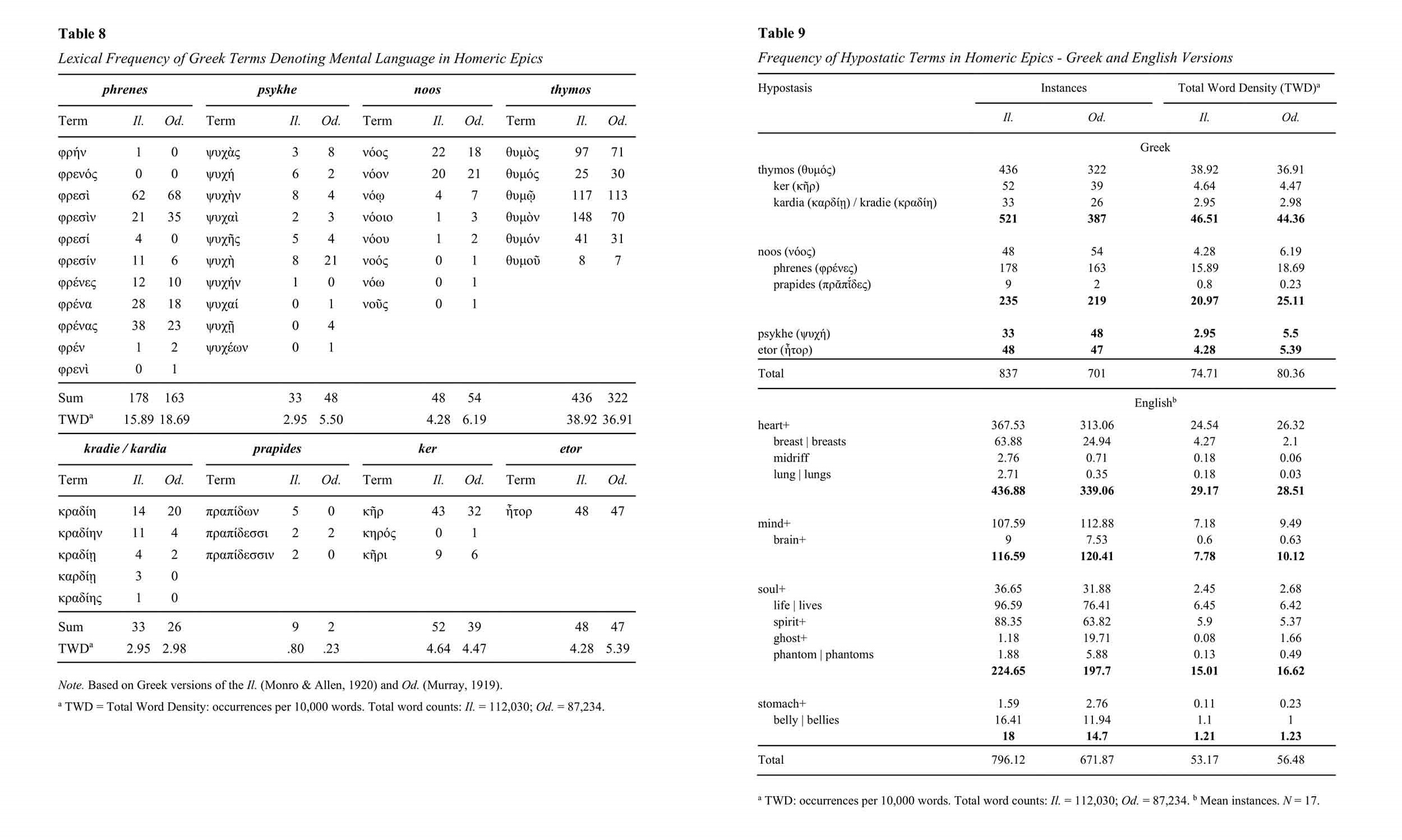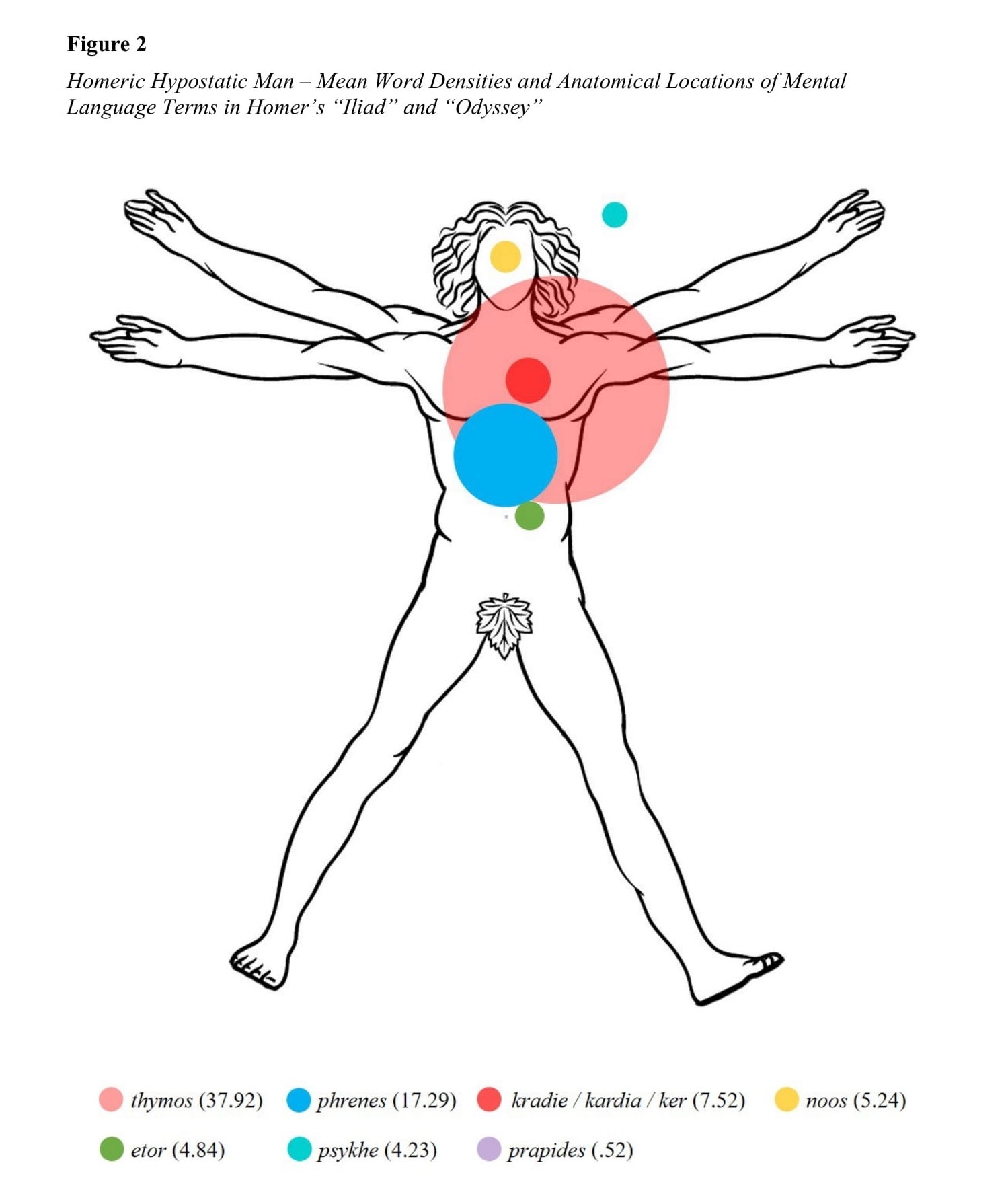Publication
Ancient Greek psychology—"'Minds' in 'Homer'"
Ancient Greek psychology—"'Minds' in 'Homer'"
The Iliad and Odyssey of Homer are considered two of the oldest and most complete epic poems. While they are believed to have been written down circa 750 BCE in ancient Greek, the contents of these hero myths may refer to the Trojan war that allegedly took place five-hundred years earlier. Because of the sheer length of each work, the epic poems represent a snapshot of human mentality right before the intellectual awakening of Greek culture. We were interested in analyzing the words used to describe the concept of "mind," and how this may have changed between the Iliad and Odyssey. To us, the results suggest that linguistic data are a productive means of analyzing the mentality of ancient humans; and that ancient Greek mentality differs from modern attitudes with respect to the nature, complexity, and locality of thinking.
Following double-blind peer review, the research was presented by Boban Dedović at the 12th International Conference on the Mental Lexicon in Niagara-on-the-Lake, Ontario, Canada, between October 11–14, 2022.
Publication
‘Minds’ in ‘Homer’: A quantitative psycholinguistic comparison of the Iliad and Odyssey
By Boban Dedović on October 10, 2022“My child, why do you weep? What grief has come upon your phrenes (φρένες)? Speak—conceal not in noos (νόος) in order that we both may know,” so speaks Achilles’ mother Thetis as the fierce warrior weeps tears of wrath on the beaches of Troy (Il. 1.362-363). To be sure, noos likely translates as mind in English in the above passage. However, Homer’s Iliad and Odyssey include a total of eight such words that may be rendered as mind, heart, or spirit: noos (νόος), thymos (θυμός), psykhe (ψυχή), phrenes (φρένες), prapides (πρᾰπῐ́δες), kardia (κᾰρδῐ́ᾱ), kradie (κρᾰδῐ́η), ker (κῆρ), and etor (ἦτορ). This complicated situation with Greek translations of mind is at the heart of this study’s empirical investigation. To wit, what is mind in the Il. compared to the Od.? The present investigation sought to quantify and compare the use of mental language in the Homeric epics by means of computational linguistics. Prior scholarly investigations have been mostly qualitative; the few quantitative studies conducted utilized miniscule sample sizes of English translations. Two studies were conducted. 17 translators who translated both the Il. and Od. into English were selected (within-subjects design). The texts were sanitized and compiled for lexical frequency analyses in Voyant, a digital linguistic analysis tool. Study 1 compared how often mental language terms appeared in both works. Results showed that total word density of mental language increased significantly from the Il. to the Od. in both English translations as well as in the original Greek version. Study 2 compiled an English glossary of mental language terms and counted the frequencies for the 34 total works. A paired-samples t-test was conducted to compare the mean mental language densities of the Il. and Od. across 17 translators. There was a significant difference in the mean densities for the Il. (M = 68.2, SD = 8.9) and Od. (M = 91.9, SD = 11.6) conditions; t(16) = -17.798, N = 17, p .001, d = -4.317. Further correlational tests as well as ANCOVA were conducted in order to determine if various factors could explain the large effect size. No significant results were observed or relevant. All hypotheses were supported. These data suggest that the Od. contains much more mental language than the Il. Implications and limitations are discussed.
Background
The Iliad and Odyssey are Homeric epic poems that were likely written down circa 750 BCE in an ancient Greek script.[1] Each work contains twenty-four books originally written in metered verse form, or dactylic hexameter. The Iliad is roughly 16,000 lines long while the Odyssey is about 12,000. Authorship has been traditionally attributed to a single man named Homer. It is widely believed that the Odyssey is a narrative sequel to the Iliad because they both temporally anchor their plots with respect to the alleged Trojan war in circa 1183 BCE.
The first line of each epic explains what the story is about:
(Green, Iliad, 1.1–2)[2]
μῆνιν ἄειδε θεὰ Πηληϊάδεω Ἀχιλῆος οὐλομένην,
ἣ μυρί᾽ Ἀχαιοῖς ἄλγε᾽ ἔθηκε
Wrath, goddess, sing of Achilles Pēleus’s son’s calamitous wrath,
which hit the Achaians with countless ills—
(Green, Odyssey, 1.1–2)[3]
ἄνδρα μοι ἔννεπε, μοῦσα, πολύτροπον, ὃς μάλα πολλὰ πλάγχθη,
ἐπεὶ Τροίης ἱερὸν πτολίεθρον ἔπερσεν
The man, Muse—tell me about that resourceful man, who wandered
far and wide, when he’d sacked Troy’s sacred citadel
The Iliad is mainly a war story concerning Achilles, a soldier fighting for the Greeks during the last two weeks of the Trojan war. Most of the epic is about Achilles’ rage and their consequences. The Odyssey is about Odysseus, who undergoes a ten-year naval journey to come home after the Trojan war. Then, it proceeds with detailing Odysseus’ perilous journey home to Ithaca, whereby he comes home to reunite with his wife and son. Odysseus is the only survivor of his original crew.
 Sketches depicting scenes from the Iliad. (Left) Stanisław Wyspiański, Achilles, którego Pallas za włosy wstrzymała, 1897. Pencil drawing, 35 x 46.5 cm, National Museum in Krakow, Krakow, Poland. (Right) Stanisław Wyspiański, Thetis emerges from the waves towards his son (Tetyda and Achilles), 1897. Pencil drawing, 23 x 29 cm, National Museum in Krakow, Krakow, Poland. Source: OMNIKA
Sketches depicting scenes from the Iliad. (Left) Stanisław Wyspiański, Achilles, którego Pallas za włosy wstrzymała, 1897. Pencil drawing, 35 x 46.5 cm, National Museum in Krakow, Krakow, Poland. (Right) Stanisław Wyspiański, Thetis emerges from the waves towards his son (Tetyda and Achilles), 1897. Pencil drawing, 23 x 29 cm, National Museum in Krakow, Krakow, Poland. Source: OMNIKA
In Homeric Greek, there is no single word for "mind," "soul," "consciousness," or the seat of agency; instead, there are several words that embody the function or location of cognition. The main terms associated with the modern notion of mental activity include thymos (θυμός), phrenes (φρένες), kardia (καρδία), kradie (κραδίη), etor (ἦτορ), psykhe (ψυχή), prapides (πρᾰπῐ́δες), and noos / nous (νόος). Prior attempts to define or psychologically profile these terms consistently have been made; however, these terms have no firm English-equivalents. Consequently, any single definition or usage pattern may be refuted by numerous counterexamples.
Approach
While much scholarship concerning the Iliad and Odyssey exists, most prior investigations did not utilize statistical approaches. As a result, many arguments put forth by others have been subject to intense disagreement and scrutiny. Psychological arguments–in particular–are easier to criticize because they rely on the investigator's subjective interpretation. To increase objectivity and reduce subjectivity as much as possible, "'Minds' in 'Homer'" relied on an approach that observed the scientific method. For example, the two studies were quantitative analyses of word frequencies. Despite being imperfect, an empirical approach separates data from interpretations; that is, it allows for independent review of all findings by third parties. As the images below demonstrate, comprehensive data tables cause to enable productive discussion amongst investigators of different opinions.
 Data tables of 'mind' words in the Homeric epics. Dedović, 'Minds in Homer,' 35–36. Source: OMNIKA
Data tables of 'mind' words in the Homeric epics. Dedović, 'Minds in Homer,' 35–36. Source: OMNIKA
In distinguishing between these data and their implications, disagreements may be reduced to a smaller compass. This approach seems to be more robust because of its transparent nature.
Main findings
The goal of "'Minds' in 'Homer'" was to assess the frequency of Greek words related to "mind" alongside how other translators chose to understand them. By throwing light upon empirical facts, three outstanding Homeric questions were expounded upon: (1) was the author of the Iliad and the Odyssey a single person; (2) if so, was it a single person named Homer; and (3) if not, which of the works is older? Moreover, what do these empirical data tell us about the mentality of early Greek-speaking people? The results may be summarized as standalone statements, listed below:
- Reported findings
- The Odyssey probably contains more mental language than the Iliad
- The poems were probably not written by a single man named "Homer"
- The Iliad is probably the older of the two works
- The poems contain at least eight words that modern translators may translate as "mind"
- Translation disagreements among experts almost always come to pass when a psychological interpretation is possible or necessary
- Human mentality changes over time
As demonstrated, the Homeric epics utilized not one but many "mind" words; and its authorship is unlikely to be a single person. In sum, the question of "mind in Homer" deserves rephrasing into distinct questions related to "minds" and "Homer."
Beyond the reported findings, additional observations may be noted:
- Derived findings
- Computational linguistic approaches are a robust means of analyzing lengthy texts
- The construct of "mental language" is difficult to define and measure empirically
- The study of Homeric psychology may be better served by means of distinguishing between Iliadic psychology and Odyssean psychology
- There is no robust framework for differentiating between idiomatic and non-idiomatic expressions
- Words and phrases used to describe mental states in Indo-European languages differ from that of other language families
- The assumption that human mentality does not change over time hinders concerned scientific inquiry
- Dating of ancient myths ought to distinguish between the date something was written down in contrast to its creation date
The locality of thinking, too, deserves especial mention. If asked where thinking takes place inside the body, most native English-speakers respond with brain, head, and sometimes heart. However, word frequency data from "'Minds' in 'Homer'" would suggest that ancient Greeks did not agree. Instead, thinking was anatomically localized in the chest area, as shown below:
 Anatomical locations of mind words in Homer. Dedović, 'Minds in Homer,' 37, fig. 2. 'Note: Illustration by Boban Dedović. The numeric values in the key represent mean Total World Density (TWD) between both the Il. and Od. (occurrences per 10,000 words).' Source: OMNIKA
Anatomical locations of mind words in Homer. Dedović, 'Minds in Homer,' 37, fig. 2. 'Note: Illustration by Boban Dedović. The numeric values in the key represent mean Total World Density (TWD) between both the Il. and Od. (occurrences per 10,000 words).' Source: OMNIKA
As demonstrated, the question of the locality of thinking presents modern psychology with a fascinating problem: reconciling ancient mentalities and beliefs with modern ones. The logical consequence of this problem is that it prompts us to consider questions we may have never asked. That is, if ancient Greeks regarded mental processes as chest-area activities, we must reasonably consider that there may be other notable psychological differences between ancients and moderns. Finally, these findings concerning ancient mentalities in the Iliad and Odyssey are not isolated incidents. Instead, they represent a pattern observed across all ancient cultures and their writings.
About the conference
The International Conference on the Mental Lexicon is an annual gathering of researchers focused on language and psychology. The 2022 conference was held between October 11–14, 2022, at Queen's Landing hotel in Niagara-on-the-Lake, Ontario, Canada. The listed organizers were Lori Buchanan, Victor Kuperman, and Gary Libben. The conference's website provides the following description:
("Conference description," Mental Lexicon 2022)
"We have missed you and we are very happy to announce that the 12th Mental Lexicon conference will be held in person beginning on the evening of October 11 and concluding in the afternoon of October 14, 2022 in Niagara-on-the-Lake, Ontario, Canada.
The conference will bring together psycholinguistic, neurolinguistic, and computational research on the representation and processing of words in the mind/brain. The conference encourages a variety of perspectives on lexical representation and processing.
Almost 25 years ago, the International Conference on the Mental Lexicon was created with a goal of creating a collegial and supportive environment for the reporting and development of cutting-edge research on lexical representation and processing. The planning of the Twelfth International Conference on the Mental Lexicon is built upon that tradition, particularly now that we emerge nationally and internationally from a period in which it is been very difficult to hold in-person meetings and to interact with colleagues."
For more information about the conference, please refer to the PDF booklet of abstracts or visit https://mentallexicon.artsrn.ualberta.ca
![]() Mental Lexicon 2022 conference photos. (Left) Poster showing directions to the conference at Queen's Landing. (Middle) Boban Dedović's pre-presentation teaser poster of a vitruvian man with circles depicting the anatomical locations of mind words in Homer. (Right) Boban Dedović in a dark, checkered jacket explaining the contents of his research to an onlooker in a white shirt. Source: Instagram
Mental Lexicon 2022 conference photos. (Left) Poster showing directions to the conference at Queen's Landing. (Middle) Boban Dedović's pre-presentation teaser poster of a vitruvian man with circles depicting the anatomical locations of mind words in Homer. (Right) Boban Dedović in a dark, checkered jacket explaining the contents of his research to an onlooker in a white shirt. Source: Instagram
Disclosures: Partial funding for this research publication and its contents was provided by the OMNIKA Foundation, a Nevada-based 501(c)(3) nonprofit managed under the auspices of the Consciousness Research Society (CRS). Boban Dedović is a psycholinguist who serves as the Executive Director of the OMNIKA Foundation as of this writing. Article copyright © 2021 Boban Dedović, some rights reserved.